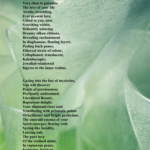A friend sent me this today, and its simplicity resonated with me deeply – no new revelations, just reaffirmation of important things we can easily forget.
 Four Principles of Spiritual Living
Four Principles of Spiritual Living
The First Principle states:
“Whomsoever you encounter is the right one”
This means that no one comes into our life by chance. Everyone who is around us, anyone with whom we interact, represents something, whether to teach us something or to help us improve a current situation.
The Second Principle states:
“Whatever happened is the only thing that could have happened”
Nothing, absolutely nothing of that which we experienced could have been any other way. Not even in the least important detail. There is no “If only I had done that differently…, then it would have been different…”. No. What happened is the only thing that could have taken place and must have taken place for us to learn our lesson in order to move forward. Every single situation in life which we encounter is absolutely perfect, even when it defies our understanding and our ego.
The Third Principle states:
“Each moment in which something begins is the right moment.”
Everything begins at exactly the right moment, neither earlier nor later. When we are ready for it, for that something new in our life, it is there, ready to begin.
The Fourth Principle states:
“What is over, is over.”
It is that simple. When something in our life ends, it helps our evolution. That is why, enriched by the recent experience, it is better to let go and move on.
Think it is no coincidence that you’re here reading this.
If these words strike a chord, it’s because you meet the requirements and understand that not one single snowflake falls accidentally in the wrong place!
Be good to yourself.
Love with your whole being.
Keep your heart aflame…









